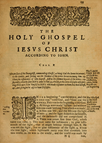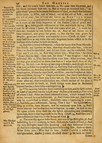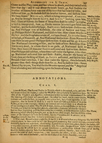The preface of the Evangelist, commending Christ (as being God the Son incarnate) to the Gentiles, and setting out the blindness of the Jews in not receiving him. (19) Then, the testimonies of John Baptist, first to the solemn legacy of the Jews: (29) secondly, when he saw Jesus come to him: (35) thirdly, to his own Disciples also putting them over from himself to Jesus who made it plainer to them that he is Christ, and so began he also to have Disciples.
IN THE beginning • was the word, and the word was • with God, and • God was the word. 2This was in the beginning with God. 3All things were made • by him; and without him was made ‘nothing. That which was made’, 4in him was life, and the life was the light of men; 5and the light shineth in darkness, and the darkness did not comprehend it.
6There was a man sent from God, whose name was John. 7This man came for testimony; to give testimony of the light, that all might believe through him. 8He was not the light, but to give testimony of the light. 9It was the true light, which lighteneth every man that cometh into this world. 10He was in the world, and the world was made by him, and the world knew him not. 11He came into his own, and his own received him not. 12But as many as received him, • he gave them [a] power to be made the sons of God, to those that believe in his name. 13Who, not of blood, nor of the will of flesh, nor of the will of man, but of God are born. 14And • the word was made flesh, and dwelt in us (and we saw the glory of him, glory as it were of the Only-begotten of the Father) full of grace and verity. 15John giveth testimony of him, and crieth saying: This was he of whom I spoke, He that shall come after me, [b] is made before me; because he was before me. 16And of his fullness we all have received, and grace for grace. 17For the law was given by Moyses, grace and verity was made by Jesus Christ. 18God • no man hath seen at any time: the only begotten Son which is in the bosom of the Father, he hath declared.
19And this is John’s testimony, when the Jews sent from Jerusalem Priests and Levites to him, that they should ask him: Who art thou? 20And he confessed, and did not deny; and he confessed: That I am not Christ. 21And they asked him: What then? Art thou * Elias? And he said: I am not. Art thou [c] * the Prophet? And he answered: No. 22They said therefore unto him: Who art thou, that we may give an answer to them that sent us? What sayest thou of thyself? 23He said: I am the voice of one crying in the desert, make straight the way of our Lord, as Esay the Prophet said. 24And they that were sent were of the Pharisees. 25And they asked him, and said to him: Why then doest thou baptize, if thou be not Christ, nor Elias, nor the Prophet? 26John answered them, saying: * [d] I baptize in water; but there hath stood in the midst of you whom you know not. 27The same is he that shall come after me, that is made before me; whose latchet of his shoe I am not worthy to loose. 28These things were done in Bethania beyond Jordan, where John was baptizing.
29The next day John saw Jesus coming to him, and he saith: Behold the lamb of God, behold him that taketh away the ‵sin, of the world. 30This is he of whom I said, After me there cometh a man, which is made before me; because he was before me. 31And I knew him not, but that he may be manifested in Israel, therefore came I baptizing in water. 32And John gave testimony, saying: That I saw • the Spirit descending as a dove from Heaven, and he remained upon him. 33And I knew him not: but he that sent me to baptize in water, he said to me, He upon whom thou shalt see the Spirit descending and remaining upon him, he it is that baptizeth in the Holy Ghost. 34And I saw; and I gave testimony that this is the Son of God.
35The next day again John stood, and two of his Disciples. 36And beholding Jesus walking, he saith: Behold the Lamb of God. 37And the two Disciples heard him speaking, and they followed Jesus. 38And Jesus turning, and seeing them following him, saith to them: What seek you? Who said to him: Rabbi (which is called by interpretation, Master) where dwellest thou? 39He saith to them: Come and see. They came, and saw where he abode, and they tarried with him that day; and it was about the tenth hour. 40And Andrew the brother of Simon Peter was one of the two that had heard of John, and followed him. 41He findeth first his brother Simon, and saith to him: We have found [e] Messias, which is being interpreted, Christ. 42And he brought him to Jesus. And Jesus • looking upon him, said: Thou art Simon the son of Jona; thou shalt be called [f] Cephas, which is interpreted, Peter. 43On the morrow he would go forth into Galilee, and he findeth Philippe. And Jesus saith to him: Follow me. 44And Philippe was of Bethsaida, the city of Andrew and Peter. 45Philippe findeth Nathanael, and saith to him: Him whom Moyses in the law, and the Prophets wrote of, we have found, Jesus the son of Joseph, of Nazareth. 46And Nathanael said to him: From Nazareth can there be any good? Philippe saith to him: Come and see. 47Jesus saw Nathanael coming to him, and he saith of him: Behold an Israelite in very deed, in whom there is no guile. 48Nathanael saith to him: How knowest thou me? Jesus answered and said to him: Before that Philippe did call thee, when thou wast under the figtree, I saw thee. 49Nathanael answered him and saith: Rabbi, thou art the Son of God, thou art the King of Israel. 50Jesus answered, and said to him: Because I said unto thee, I saw thee under the figtree, thou believest; greater than these things shalt thou see. 51And he saith to him: Amen Amen I say to you, You shall see the Heaven opened, and the * Angels of God ascending and descending, upon the Son of man.
Footnotes
- ↑ Beza falsely translated dignitatem for potestatem εξουσια
- ↑ He is preferred and made of more dignity and excellence than I, because he was before me and all things Eternal God.
- ↑ By like the Jews ignorantly understood not the place in Deuteronomy, of Christ, and therefore they ask also whether he be the Prophet there spoken of. See also. c. 7, 40.
- ↑ He doth often here siginify the great difference of his Baptism and of Christ’s, as of his person and Christ’s. See Annot, Mat. 3.
- ↑ Messias in Hebrew, in Greek Christ, in English Anointed, to wit, with the spiritual oil of grace above his brethren. Ps. 44.
- ↑ Cephas in Syriac, and Peter in Greek, in English Rock. See Mat. 16, 18.
ANNOTATIONS. CHAP. I.
↑ 1. Was the Word.) The second Person in Trinity which is the natural, only, and eternal Son of God the Father, is called the WORD: not as the holy Scriptures or speeches of the Prophets and Apostles (written and spoken by God’s commandment for the uttering of his divine will towards man) be called his word, but in a more divine, eminent and ineffable sort, to express unto us in a sort, by a term agreeable to our capacity, that the Son of God so is and so from everlasting is born of God the Father, as our prime concept (which is our internal and mental word) is and issueth out of our intelligence and mind. This WORD then, Son, or second Person in the holy Trinity, was and had his being then already, when other creatures (of what sort soever) had but their beginning, and therefore cannot be a creature, as many Heretics before the writing of this Ghospel thought, and as the Arrians after taught. And this first sentence of the Ghospel not only the faithful, but the Platonics did so admire (as St. Augustine writeth) that they wished it to be written in gold.
↑ 1. With God.) Because a man might say; If the WORD were before anything was created, where or how could he be?, the Evangelist preventing that carnal concept, saith first, that he was with God, whose being dependeth not upon time, place, space, or any other creatures, all which were made by him. Secondly, he giveth us to understand, that the WORD hath his proper subsistence or personality distinct from God the Father, whereby Sabellius the old Heretic is refuted. Thirdly, here is insinuated the order of these two persons, one towards the other, to wit, that this Son is with and of the Father, and not the Father of the Son. Fourthly, you may confute here the blasphemy of Calvin, holding the second Person to be God, not as of the Father, but as of himself. And yet such are the books that our youth now read commonly in England, and that by commandment.
↑ 1. God was the Word.) Lest any man upon the premises, which set forth the relation and distinction of the second Person from the first, might think that the Father only were God, the Evangelist expressly teacheth, the WORD to be God. For though the words seem to lie otherwise (because we have of purpose followed the elegancy which the Evangelist himself observed in placing them so, and therefore they stand so both in Greek and Latin) yet indeed the construction is thus: The WORD was God, and (as in his first Epistle the same Apostle writeth) true God: lest any might say (as the Arians did) that he was God indeed, but not truly and naturally, but by common adoption or calling, as good men in the Church be called the sons of God. What wonderful wrangling and tergiversation the Arians used to avoid the evidence of this place, we see in St. Augustine lib. 3 de Doct. Christ. ch. 2. even such as the Protestants do, to avoid the like words, This is my body, concerning the Bl. Sacrament.
↑ 3. By him.) Again, by this he signifieth the eternity, divinity, omnipotence, and equality of the WORD or Son, with God the Father, because by him all things were created. All things he saith, both visible of this world: and invisible, as Angels and all spiritual creatures. Whereupon it is evident also, that himself is no creature, being the Creator of all: neither is sin of his creation, being a defect of a thing, rather than a thing itself, and therefore neither of nor by him.
↑ 12. He gave them power.) Free will to receive or acknowledge Christ, and power given to men, if they will, to be made by Christ the sons of God: but not forced or drawn thereunto by any necessity.
↑ 14. The Word made flesh.) This is the high and divine testimony of Christ’s incarnation and that he vouchsafed to become man. For the acknowledging of which inexplicable benefit and giving humble thanks for the same, all Christian people in the world by tradition of the Fathers prostrate themselves or kneel down, when they hear it sung or said at the holy Mass, either in this Ghospel, or in the Creed by these words: ET HOMO FACTUS EST.
↑ 18. No man hath seen.) Never man in this mortality saw God in the very shape and natural form of the divine essence, but men see him only in the shape of visible creatures, in or by which it pleaseth him to show himself unto many diversely in this world: but never in such sort as when he showed himself in the Person of the Son of God, being made truly man and conversing with men.
↑ 32. The Spirit.) Here is an evident testimony of the third Person in Trinity, which is the Holy Ghost: so that in this one Chapter we find expressly against all Heretics, Jews, and Pagans, set forth the truth of the Church’s doctrine concerning the whole Trinity.
↑ 42. Looking upon him.) This beholding of Simon, insinuateth Christ’s designment: and preferring of him to be the chief Apostle, the Rock of the Church and his Vicar; and therefore upon that Divine providence and intention he accordingly changeth his name, calling him for Simon, Cephas, which is a Syriac word, as much to say as Rock or Stone. And St. Paul commonly calleth him by this name Cephas, whereas other both Greeks and Latins call him altogether by the Greek word, Peter, which signifieth the self-same thing. Whereof St. Cyril saith, that our Saviour by foretelling that his name should no more now be Simon, but Peter, did by the word itself aptly signify, that on him, as on a rock and stone most firm, he would build his Church.
Margin Notes
- intro. The I. part: THE ACTS of Christ before his manifestation, while John Baptist was yet baptizing.
- 1–14. The Ghospel at the third Mass upon Christmas day. And every day at the end of Masse.
- 14. ET VERBUM CARO FACTUM EST.
- 19–23. The Ghospel upon the 3. Sunday in Advent.
- 29–34. The Ghospel on the octave of the Epiphany.
- 35–51. The Ghospel upon St. Andrew’s eve.
- 47–51. The Ghospel in a votive Mass of the holy Angels.
- annot. 1. How God the Son is call the WORD.
- annot. 1. The Platonics
- annot. 1. The WORD true God by nature.
- annot. 1. The Protestants are like the wrangling Arians.
- annot. 3. The WORD not a creature but the Creator.
- annot. 12. Free-will.
- annot. 14. Humble kneeling at the solemn words of Christ’s incarnation.
- annot. 18. How mortal men see God.
- annot. 32. The Bl. Trinity.
- annot. 42. Peter by his new name designed to be the Rock of the Church.
Margin References
- 3. ‘nothing that was made’
- 21. Mal. 4, 5.
- 21. Deu. 18, 15.
- 23. Esa. 40, 3.
- 26. Mat. 3, 11. Mar. 1, 8. Luc. 3, 16.
- 29. ‵ sins Agnus Dei at Mass.
- 51. Gen. 28, 22.
- annot. 1. Augu. de Civ. Dei. lib. 10. ch. 29.
- annot. 1. The WORD co-eternal with the Father, distinct in Person and of the Father.
- annot. 1. Calv. inst. lib. 10, 13. Sect. 23. and 25.
- annot. 1. 1. Joh. ch. 5, 20.
- annot. 42. Cephas. Petrus. Lib. 2. ch. 12. in John.




